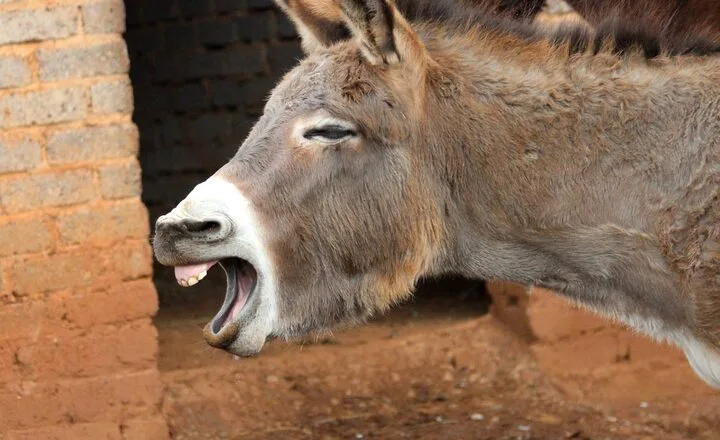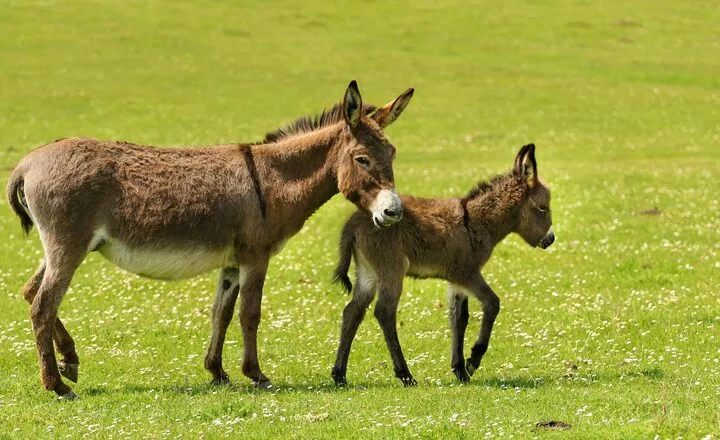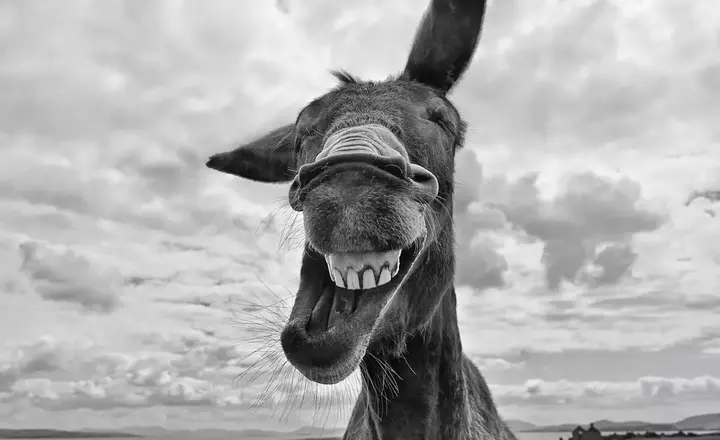Donkeys are often portrayed as stoic and hardworking animals, known for their ability to carry heavy loads and navigate rough terrains with unwavering determination. But have you ever wondered if these humble creatures possess a sense of humor? Can donkeys laugh?
This seemingly whimsical question delves into the fascinating world of animal behavior and communication, challenging our perceptions of laughter as a purely human experience.
Can Donkeys Laugh?
Donkeys do not laugh in the same way that humans do. The sound they produce, known as braying, can often be misinterpreted as laughter.
They use their facial expressions and vocalizations to communicate various emotions such as warning signals, pain, joy, or loneliness. The braying sound can also indicate territorial behavior or discomfort.
The display of teeth by a donkey is actually a Flehmen response, where the animal curls its upper lip and inhales through the nostrils. This behavior is not related to laughter but rather serves as a way for the donkey to investigate scents in their environment.
It is often mistaken for a laugh, but it is actually a behavior seen in many animals like camels. This response involves curling back the upper lip to transfer scents to the vomeronasal organ located above the mouth.
This organ helps process and analyze new smells, allowing the animal to gain more information about its surroundings. Some experts also believe that the Flehmen response serves as a form of intra-species communication among animals.
By sharing and analyzing scents through this behavior, animals can convey important messages about their environment, potential mates, or even potential threats. It plays a crucial role in helping animals gather information and communicate effectively within their species.
Donkeys Can Neither Smile Nor Laugh
They may not be able to physically smile or laugh in the same way that humans or some other animals can, but they do have their own ways of expressing contentment and happiness.
Donkeys often show their emotions through body language, such as relaxed ears, soft eyes, and gentle vocalizations. They may also wag their tails or nuzzle each other as a sign of affection.

While donkeys may not have a visible laugh like baboons or chimpanzees, they are still capable of forming strong bonds with humans and other animals. Donkeys are known for their gentle and loyal nature, making them valuable companions and working animals.
With not having the ability to smile or laugh in the traditional sense, donkeys have their own unique ways of communicating joy and forming connections with those around them.
Hee-Haw Sound Or The Flehmen’s Response
The hee-haw sound and the flehmen response are both natural behaviors exhibited by donkeys in different situations.
The hee-haw sound is a vocalization that donkeys use to communicate with each other, often expressing excitement, frustration, or discomfort.
It is a behavior where the donkey curls back its lips to expose its teeth and inhales deeply through its nose to analyze scents in the air.
Territory
By sniffing and curling their lips, they can detect pheromones and other scents that help them determine the presence of dominant males or potential threats.
In wild they are known to be territorial animals, and maintaining control over their domain is crucial for survival.
The act of chasing away young male donkeys from females is a common behavior seen in many species as a way to establish hierarchy and ensure reproductive success.
By understanding these behaviors and communication methods, we can gain insight into the complex social dynamics of donkey communities and how they navigate their environments to protect their territories and ensure their place within the group.
Anger & Danger
When donkeys display expressions similar to laughing, it could indicate that they are feeling angry or sensing imminent danger from predators.

Braying, the loud vocalization donkeys make, serves as a way to get the attention of other donkeys and human caretakers, especially when there is a perceived threat nearby. This behavior helps alert others in the vicinity about potential dangers like lions, wolves, or foxes.
Why Do Donkeys Not Laugh or Smile?
Like many other animals donkeys have their own ways of expressing emotions that may not always involve smiling or laughing.
While donkeys may not exhibit these expressions in the same way humans do, they are still capable of feeling joy and contentment. Donkeys are known to bray loudly when they are excited or happy, which can be considered their way of showing appreciation or happiness.
It is important to remember that different species have evolved unique communication methods based on their natural behaviors and environments.
Being hardworking animals with a strong sense of duty, may prioritize stoicism and resilience over overt displays of emotion like laughter or smiling.
What Does The Donkey’s Laugh Sound Like?
The Hee-Haw sound is more accurately described as a braying noise, which can vary in pitch and intensity depending on the situation.
While it may seem like laughter to some people, it is important to understand that donkeys use this sound for different purposes and not necessarily to express joy or amusement.
While donkeys may not have a traditional laugh, they certainly have their own unique way of vocalizing and communicating with others.
Can Donkeys Laugh Like Humans?
Donkeys do not possess the ability to laugh or smile in the same way that humans do. Laughter is a complex behavior that is primarily observed in certain primates such as chimpanzees, gorillas, bonobos, and orangutans.

These animals exhibit laughter-like behaviors in response to various stimuli, such as playfulness or social interactions.
Conclusion
Some scientists believe that donkeys are capable of expressing emotions similar to laughter, others argue that their vocalizations may simply be a form of communication or social interaction.
As we continue to study these fascinating animals, it’s important to approach the topic with curiosity and an open mind. By observing and understanding donkeys’ behavior more closely, we may eventually uncover the truth behind their mysterious sounds and expressions.
FAQs
Do donkeys like to be touched?
Donkeys have individual preferences when it comes to being touched. Some donkeys may enjoy gentle petting and scratching, especially in areas like their neck or back.
What do donkeys like to do for fun?
Donkeys are social animals that enjoy interacting with other donkeys as well as humans. They like to play and engage in activities that stimulate their minds, such as solving puzzles or playing with toys.
Is a donkey smart?
Donkeys are known for their intelligence and problem-solving abilities. They have a strong sense of self-preservation and are cautious animals, which can be interpreted as smart behavior.
